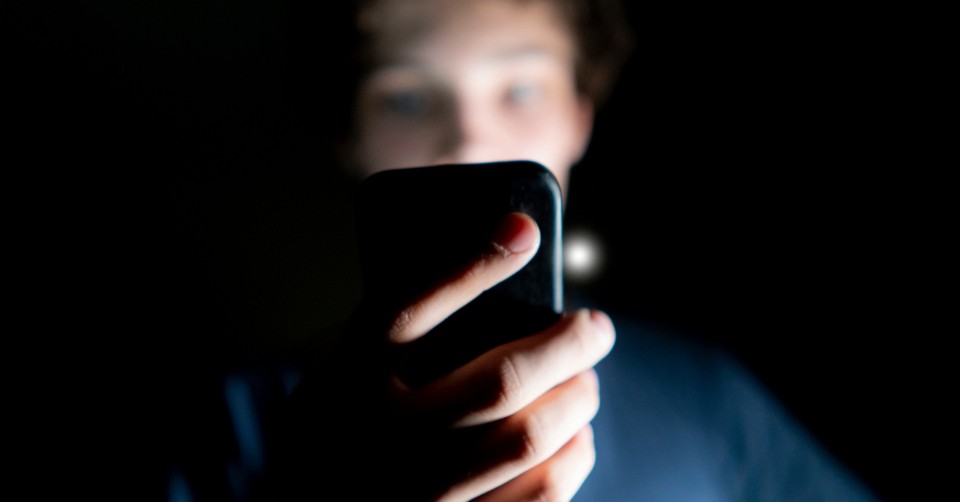5 Apps that Are Dangerous for Kids

The landscape of readily available apps is ever-changing and shifting. Just when you think you have a grip on the dangerous apps for kids, you're blindsided by another and another and another. They don't stop coming, and, I hate to say it, never well.
It's important we stay up to date and aware of the apps that we need to be sure our kids stay away from, or at least be educated about the potential dangers that come along with them. Aside from completely removing your children from accessing apps, you will need to be their filter and protector. Do not rely on an app's claims of being "safe for kids"—they can outright lie or have vastly different standards.
So, are you ready? Here we go:
1. Blendr
Don't disregard this app (or others like it) too quickly. It's easy to download and can masquerade as a "dating" app. Why would your kids be into it? You can go through and rate profile pictures as to whether they're hot or not, you can select for quick hook-ups, and it's light and easy relationships. On the surface. Below is a network of really frightening opportunities for predators, and while this app isn't marketed for kids/underage teens, that doesn't mean it's not being used. This app will use geographic locations to match you to individuals in the area in order to make meeting in person easy and quick. See the problem already?

It's not just the potential of harmful mental abuse by having others rate you low on a good-looking scale, but it's the opening up of close proximity to very real people. The intention is also not to pair up with individuals for long-term relationships. This is a hook-up app. Meaning there's flirtation, eroticism, and other such topics on the table. Privacy measures are offered, but we all know how easy it is to make fake profiles. The lure can be real. If your child is under the age of 18, avoid this app.
2. CLEANit
Apps like this bring along with it a different type of danger, and your kids will probably have good intentions when downloading it or other apps like it. This app intends to clean up your phone from junk files that have the potential to slow your system down. The problem is often apps like these change necessary internal settings that actually counteract what you're attempting to do. They also may require permissions to your phone, and some can harm the internal system of the phone itself.
The intent is decent and not unlike cleaning up your computer hard drive. Some apps are safe to use, but also unnecessary if your phone is new or working fine. In short, apps such as this aren't necessarily meant to be malicious; it's more than the child downloading it may not be aware of how it impacts their phone's system and could cause more adverse reactions than positive ones.
Advise your child to stay away from phone cleaning apps and only choose an app under the instruction of your cellular provider or a device professional.
3. Sideloading
This isn't an app specifically, but apps created by third-party sites. What does this mean, and how does it affect your children? In short, and in simplistic terms, when your child goes to a place like the Play Store to download an app, they're then directed to a third-party site to download. Apple does not allow sideloading in its app store, ensuring that all apps available there are Apple-approved. But if you have an Android system, odds are you will have access to sideloading quite easily.
The problem with sideloading is that anyone and your mother's brother could be out there creating apps with little to no security restraints. They are dangerous and can load malware onto your device, as well as explicit and dangerous content.
For example, by downloading a third-party app, your child may also download content that will send pornographic photos, erotic propositions, and more to your child's device. They may be playing a harmless and parental-approved game, but because an app was sideloaded sometime previously, an "XXX Come and See" message may easily pop up in their notifications giving your child instant access to predators, porn, and heaven knows what else. Be very aware of being available to help your child download apps and make sure you are downloading them from reliable sources.
4. Pokémon GO
Here is a gaming app that, for the most part, is harmless in and of itself. (unless you have specific convictions regarding Pokémon itself—an entirely different topic of conversation). For the purpose of the game, kids have fun collecting characters, powering them, taking part in battles both on their own and against other real-life players.
Here's the part you, as a parent, need to be cautious of. The app itself will track your location based on the GPS internally in the phone. This is done to help find Pokémon, Pokémon battles, etc. That being said, your child's location is available and can be tracked by super-smart predators. Also, the camera must often have permission so the game can play, which opens it up as well to the game controlling the camera functions. Hackers could have fun with that!
While the game itself isn't technically dangerous, it's important to pay attention to things like this in the apps your child downloads. Is their location being tracked? Does the app have rights to its camera? If so, you're going to want to be extra cautious. Unfortunately, the world isn't a safe place, and even if the creator is trustworthy, its hackers are not.
5. Anonymous Chatting Apps

What are they? These are apps that allow you to have conversations anonymously with anyone. Apps like Yik Yak or After School App were popular just a few years ago, and chatters had a heyday with them. Inclusion of anonymous bullying, racial slurs, explicit content, and more. While After School is no longer available (last I checked) and Yik Yak is under new ownership with a supposed commitment to not support this type of activity, the fact remains there is a keyword here that should raise your eyebrows: "anonymous."
Why anonymity is so attractive in the digital shouldn't be shocking. It's a lot easier to dominate with cruelty or lure with temptation when you're anonymous. And there's always that element of secrecy and intrigue that makes these apps a bit of an adventure for kids.
In short, avoid them. Just do. Encourage your kids/teens to know who they're communicating with, and, if your child is at an impressionable age, apps like Messenger Kids are great because you, as a parent, can access and supervise your child's chat and who is allowed to chat with them.
Unfortunately, no app is perfectly safe. On the other hand, all apps offer something, or they wouldn't be out there in the stores to download. The key is to be aware, be wise, and be cautious. Research the app before downloading it to your kids' devices—set guidelines for your kids when it comes to downloading apps. You can never be too safe, but you can be too trusting. The digital world is not a world where trust should be earned easily. Your child's safety, mentally, physically, and emotionally, is at stake.
Jaime Jo Wright is an ECPA and Publisher’s Weekly bestselling author. Her novel “The House on Foster Hill” won the prestigious Christy Award and she continues to publish Gothic thrillers for the inspirational market. Jaime Jo resides in the woods of Wisconsin, lives in dreamland, exists in reality, and invites you to join her adventures at jaimewrightbooks.com and at her podcast madlitmusings.com where she discusses the deeper issues of story and faith with fellow authors.
Originally published February 10, 2022.





